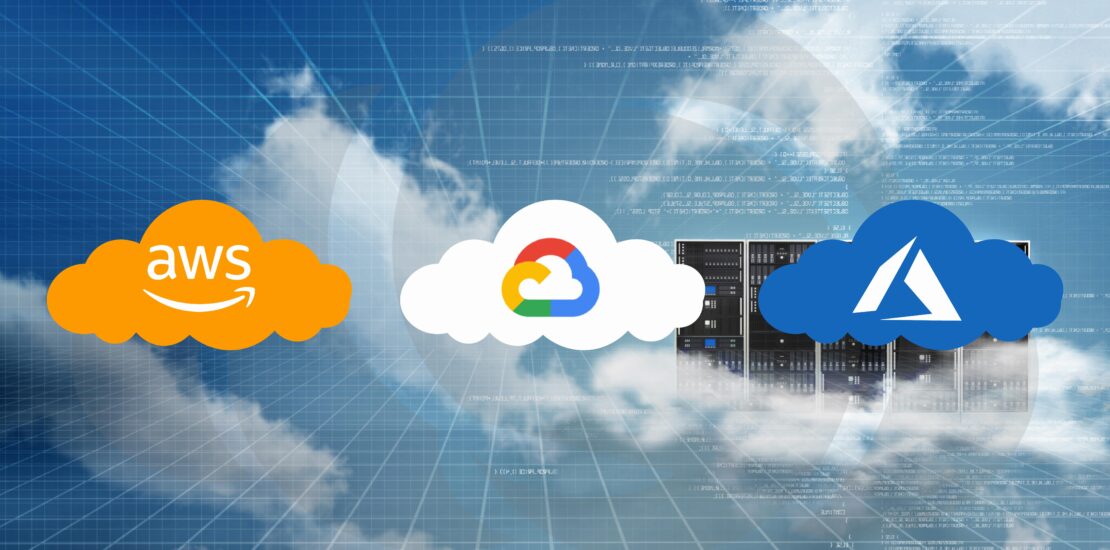Navigating the Cloud -A Comprehensive Comparison of AWS, Azure, and Google Cloud
- 22 July 2023
- Posted by: kloudpartner.com
- Categories: Cloud Services, Modern Services, Security and Cmplience

The realm of cloud computing has undergone a seismic shift, revolutionizing the way businesses operate and scale. Amid this digital transformation, cloud service providers have emerged as the catalysts, offering diverse solutions that cater to a wide spectrum of business needs. In this blog, we embark on a journey to unravel the distinctions among three titans of the cloud domain: Amazon Web Services (AWS), Microsoft Azure, and Google Cloud. By shedding light on their unique features, strengths, and use cases, we empower you to make an informed choice that aligns with your business goals.
Amazon Web Services (AWS): Pioneering the Cloud Landscape
As a trailblazer in the cloud computing arena, AWS has amassed an impressive portfolio of services that cater to businesses of all sizes. Renowned for its global infrastructure and extensive array of offerings, AWS boasts a deep-rooted presence in various industries.
AWS’s strengths lie in its expansive service selection, enabling businesses to build, deploy, and manage applications effortlessly. Whether it’s computing power, storage solutions, machine learning capabilities, or Internet of Things (IoT) resources, AWS has it all covered. The intuitive Amazon Elastic Compute Cloud (EC2) service allows users to launch virtual machines with ease, while Amazon Simple Storage Service (S3) offers scalable object storage. Additionally, AWS excels in the realm of serverless computing with Amazon Lambda, providing a cost-effective and efficient way to run code without provisioning or managing servers.

Microsoft Azure: A Holistic Cloud Ecosystem
Microsoft’s Azure platform is a testament to its prowess in enterprise solutions. Azure boasts seamless integration with Microsoft’s suite of products, making it an appealing choice for businesses entrenched in the Microsoft ecosystem.
Azure’s strengths encompass an expansive global network, robust hybrid capabilities, and a robust set of security features. Azure Virtual Machines provide a wide range of customizable virtual machine sizes, catering to different workload requirements. Azure’s identity and access management services offer robust security controls, while Azure Active Directory facilitates centralized user management. Moreover, Azure’s hybrid capabilities empower businesses to seamlessly integrate on-premises infrastructure with cloud resources, enabling a smooth migration journey.
Talk to an Expert Cloud Partner, we will provide the best options for your business!
Google Cloud: Fueling Innovation with Data Insights
Google Cloud has carved a niche by combining its expertise in data analytics and machine learning with cloud services. It’s the go-to choice for businesses seeking to harness the power of data-driven insights and innovative technologies.
Google Cloud’s strengths lie in its advanced analytics offerings, machine learning prowess, and data management capabilities. BigQuery, a serverless, highly scalable, and cost-effective multi-cloud data warehouse, enables businesses to perform sophisticated data analysis with blazing speed. Google’s expertise in machine learning is evident through Google Cloud AI and Machine Learning Engine, empowering businesses to build, deploy, and scale machine learning models. Additionally, Google Cloud’s emphasis on sustainability and energy efficiency aligns with the growing demand for eco-friendly technologies.
Choosing the Right Cloud Provider: Factors to Consider
Selecting the optimal cloud provider hinges on various factors, including your business requirements, existing infrastructure, budget constraints, and future scalability plans. Here are some pointers to guide your decision-making process:
- Workload Compatibility: Consider whether your workload aligns with the strengths of the cloud provider. AWS’s diverse offerings, Azure’s enterprise integration, and Google Cloud’s data analytics prowess cater to distinct needs.
- Cost Structure: Evaluate the cost models of each provider, keeping in mind factors like data storage, compute instances, and network usage. AWS’s pay-as-you-go model, Azure’s hybrid cost benefits, and Google Cloud’s transparent pricing all offer unique advantages.
- Data Security: Examine the security features each provider offers. AWS’s identity and access management, Azure’s integrated security tools, and Google Cloud’s security-by-design approach should be part of your assessment.
- Technical Support: Evaluate the level of technical support provided by each platform. AWS’s extensive support plans, Azure’s seamless integration with Microsoft products, and Google Cloud’s personalized customer support should influence your decision.
- Innovation and Future-readiness: Consider the provider’s commitment to innovation and emerging technologies. AWS’s early-mover advantage, Azure’s hybrid capabilities, and Google Cloud’s focus on AI and data analytics shape their innovation landscapes.
In conclusion, the choice among AWS, Azure, and Google Cloud is not one-size-fits-all. Each provider has its own strengths, and your decision should be rooted in your business’s unique needs and long-term goals. By delving into their offerings, understanding their strengths, and aligning them with your objectives, you’re poised to embark on a cloud journey that propels your business toward success in the digital era.
